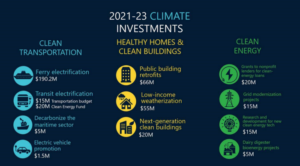In the 2019 legislative session Insurance Commissioner, Mike Kreidler proposed legislation to help our state prepare for and mitigate climate disasters. The Senate Bill 5106 was signed into law by Gov. Jay Inslee and created a workgroup represented by 27 organizations including legislators, state agencies, insurance companies, Tribal leaders, municipal groups, and other key parties to review and make recommendations on how to best coordinate and improve disaster resilience work in Washington state. The law took effect on July 28, and a final report, Disaster Resiliency Work Group Final Report – November 2020, was delivered to the state legislature on December 1, 2020.
“Resilience is the ability to prepare, mitigate and plan for, withstand and recover from, to more successfully adapt to adverse events and changing conditions, and reorganize in an equitable manner that results in a new and better condition.”
- Develop, administer, track, and communicate the state resiliency strategy’s progress.
- Conduct and coordinate research, data collection, and analysis.
- Coordinate funding and economic research tools.
- Develop, coordinate, and communicate resilience initiatives/projects.
- Serve public-private sectors as a resource and enhance collaboration, education, and outreach programs.
The Work Group strongly recommended the program reside in the Governor’s office and have the Advisory Board include memberships from tribal governments, state legislature, private entities, state agencies, local authorities, academia, special purpose districts. It must also include community members who represent
policymakers, agency heads, subject matter experts, historically marginalized groups, communities of color, people with disabilities, people who can improve language access, and people from economically and geographically diverse backgrounds.
Inslee Announces Bold Climate Package for 2021-2023 Biennium

“Climate change is a health issue, an economic issue, and an equity issue. We must address these genuine threats to our state, and we cannot wait. The time to act is now. These proposals would reduce nearly 30 million metric tons of emissions by 2030 — a 35% reduction from current projections. And these standards and investments — with justice at their core — will grow clean energy jobs in Washington,” said Governor Inslee while outlining his Washington State Climate Commitment Act 2021-22 and climate policy package for the 2021–2023 biennium.
The Governor’s legislative and budget proposals would establish a comprehensive program to implement the state’s climate commitment and convene a Climate Commitment Task Force. The program will provide accountability and authority for achieving the statewide emissions limits, establish a coordinated and strategic statewide approach to climate resilience, and build an equitable and inclusive clean energy economy.
- Requires the Governor to establish a comprehensive program to implement the state’s climate commitment.
- Establishes a cap and invest program for greenhouse gas (GHG) emissions to be implemented by the Department of Ecology (Ecology).
- Directs distribution of auction revenues for specified purposes, including clean transportation, natural climate resiliency, clean energy transition and assistance, and energy efficiency projects.
- Convenes an Environmental Justice and Equity Advisory Panel to provide recommendations on developing and implementing the cap and invest program.
- Authorizes Ecology to require persons who produce or distribute fossil fuels or other products that emit GHG in Washington to comply with air quality standards, emission standards, or GHG emission limitations.
- Defines emission, emission standard, and emission limitation as applied to GHG emissions that include indirect emissions from the production or distribution of petroleum products or natural gas.
Climate change poses an existential threat to all communities, but the impacts fall disproportionately on those most marginalized. The governor’s climate package centers environmental justice by reducing emissions in the most impacted communities, requiring that the benefits of the clean energy transition be distributed equitably and ensuring that overburdened communities have a formal role in climate governance.
The governor’s proposal would create a permanent Environmental Justice and Equity Advisory Panel, which would recommend plans and proposals for funds in the climate investment account. Any investments from the newly created climate investment account would also need to undergo an environmental justice analysis to ensure that they are directed towards eliminating environmental harm and economic and health disparities for vulnerable populations. Environmental Justice Task Force recommendations

